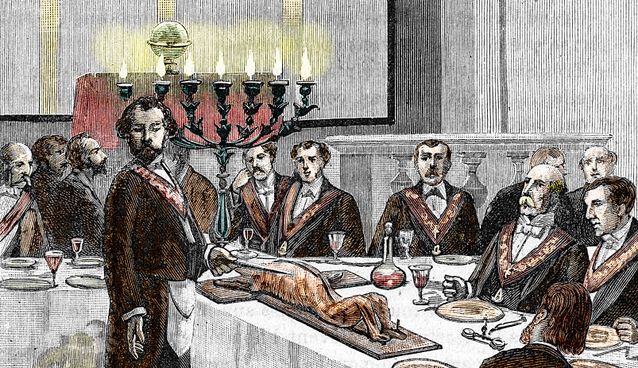
What do you do when you’re a centuries-old secret society looking to grow your membership? Make a Facebook group.
Centuries ago, Rosicrucians were only able to maintain their society through their ability to be invisible. But over the past several hundreds years, the world has changed — and, along with it, so has the need for Rosicrucians to stay shielded from the public. Now, like much of the rest of society, they’re finding new ways to connect, by pivoting to Facebook, Zoom, and YouTube.
A beginning in science fiction or reality?
When it was first founded in the early 1600s, the deadly 30 Year War was ravaging Europe. It was being fought primarily over religion, and, while the Rosicrucian Order is not exactly a religion, it is a system of study to understand natural laws. Some of its doctrine includes references to Kabbalah, Hermeticism, alchemy, and Christian mysticism. So, like other religions at the time, they had to keep their organization private for fear of persecution.
“It was a very challenging time in Europe’s history,” Julie Scott, the Grand Master of the Rosicrucian Order, told Mashable. “It was just so superstitious. And so the Rosicrucian manifestos were published anonymously.”
In the early 17th century, the first bits of Rosicrucianism began popping up in the form of anonymous pamphlets in Germany, which claimed that a group of people were secretly working to transform European politics and religion. But there’s a lot of drama surrounding whether, when the pamphlets were written, Rosicrucians actually existed, or if it was just some elaborately written pamphlet of science fiction.
Jon Crowley, a novelist who studied Rosicrucianism for some of his many novels based off of the order, has argued that the books were likely works of fantasy, not based off of lived experiences. But he acknowledges that it’s difficult to know one way or another.
“Nobody could really track them down because nobody would admit to being one.”
“The idea of an organized body of people who all belong to this group and kept themselves secret, even though they might have announced that they know about a story about a group that is the Rosicrucians — they can announce that that body or that group exists, but they never admit that they belong to it. It’s very hard to figure it out,” Crowley told Mashable. “And that’s what made it even more mysterious that there were these bodies of very scholarly, possibly magical or magician-like persons. And nobody could really track them down because nobody would admit to being one.”
Beyond the rumors
Whether they started as a secret society or as a work of fantasy, the result is the same: A group began to form that believed the pamphlets to be true. They were influenced by mystical Christian orders, and they are also linked to the beginnings of the Freemasons. More than 400 years later, there are still members today — just check Facebook.
“We’re a philosophical organization and, Rosicrucians, we have members all over the world where people are free to practice the tradition of their choice,” Scott said. “And we study natural laws so that we can live in harmony with them. So, we learn about the best time to do things, the best way to approach things, whether it’s meditation or developing our intuition, so that we get into the natural rhythm of whatever it is we’re approaching.”
“We study natural laws so that we can live in harmony with them.”
As the years passed, the invisibility that once provided the group with an armor of protection was no longer necessary. Eventually, they moved fully into the public eye, complete with glossy magazine ads in the 1970s. Today, you can watch their public talks on YouTube, Zoom into an experiment, or join one of dozens of regional and national Facebook groups.
While many of the Facebook groups are private, members can join any of them. And anyone can become a member.
“Anyone can be a member and we have moderators who make sure that somebody who’s not a member is not joining in order to sell their product or something like that,” Scott said. “So the main thing is we want people to feel welcome and included and just to be able to observe what Rosicrucians do and how we approach the world.”
The Facebook page the Rosicrucian Order AMORC, which anyone can like and follow, has more than 300,000 followers. The largest private Rosicrucian Facebook group, which you have to ask to join, has 17,000 members. Not all of the followers are members of the Order, and it’s mostly a place to do what you do on any other community-based Facebook group: set up meetups, post quotes written in cursive script on stock image backgrounds, and argue playfully in the comment sections about the artistry of Egyptian hieroglyphics.
Then there are the dozens of pages made for Rosicrucians in specific areas, which, Scott says, are really where the power of Facebook lies for them. “The strength of Facebook is it connects people locally,” Scott, who joined the Rosicrucian Order in 1993, said.
Olisa Okanime runs the organization’s local social media in Georgia and moderates a few thousand people on social media, she told Mashable. She loves the work she does with the Order, but is striving to increase their social media reach — “especially to nonmembers.”
“We have blockbusters online events right now that cater to the needs of members and nonmembers alike,” she said. “For example, we have a weekly teleconference that is hosted by our adorable Grand Master, Soror Julie Scott. It’s an amazing experience. You should check it out — nonmembers can attend.”
Karen Wark, a member who works on the Rosicrucian Order’s national social media presence, told Mashable via email that “Facebook has given us a way to connect with seekers who we would not have been able to before,” like those who live in rural areas. And, according to Wark, their membership has “increased significantly” since they launched their main Facebook page in 2009.
“We have Rosicrucian members from all over the world and being able to connect with each other in Facebook groups has been really wonderful for our members,” Wark said. “Before this, we would only see each other at world conventions, which not everyone would be able to attend.”
“Facebook has given us a way to connect with seekers who we would not have been able to before.”
Facebook also helps connect people with the formerly secret society’s other online programs, like the YouTube and Zoom sessions they host weekly, where a class master from their department of instruction presents on different topics, like pythagoras or labyrinth. Once a quarter, they have a symposium on those platforms, where members watch several different presentations and participate in an experiment or meditation at the end.
What comes next?
It’s not clear what the future of organizations like the Rosicrucians will be, as membership in voluntary associations has been steadily falling in everything from church groups to Greek organizations. According to a 2019 Joint Economic Committee congressional report, membership rates in some of these organizations fell from 75% in 1974 to 62% in 2004. But Scott says the involvement of social media has actually helped memberships grow for Rosicrucians.
“We began presenting the Wednesday teleconferences in 2015,” Scott said. “Two of our class masters felt that this would be a great way to reach members who were in more remote areas. And we would regularly have maybe 75 to 85 participants every Wednesday for a number of years. And since the pandemic, on the Wednesday teleconferences, we have usually between 400 and 500 participants now, and for our symposiums that we present once a quarter, we usually max out at 1000.”
Okanime also says social media is helping to increase their numbers.
“With a global pandemic and no in-person activities, coupled with seasoned and coordinated expertise from our Grand Lodge, we are experiencing exponential growth in both membership and online participation,” she said.
The pandemic appears to be one of the big pushes to put the Order online. That’s why they hired Jason Lopez, who joined the organization in 2015, to be the communications manager in California.
“It’s a new role created by the Order to address the growing need to adapt during the pandemic,” Lopez said. “Our lodges were closed but we still wanted to connect our members the best way we can, [by] making sure that every moment spent in these trying times are alleviated by the lessons from the lectures we host and the content that we produce, that can ultimately create a sense of community online, if not in person.”
But even with the vaccine rolling out, and in-person gatherings becoming more and more likely, Lopez and Okanime are confident their online outreach will continue to increase membership.
“The trend has always been upward, even before I took on the role,” Lopez said. “It’s a confirmation that more people online are looking into esotericism, philosophy, and ancient wisdom teachings. Hopefully they can find some answers to their questions with the Rosicrucian Order.”
With committed social media managers and members across multiple states and countries, it makes sense that a pivot online could serve as a savior of sorts to their community. But their transition from existing only in the shadows to working within one of the most infamously public spaces in the world is a fascinating choice. With what we know about the lack of privacy on Facebook, their willingness to embrace the platforms shows that the group is more dedicated to the “society” aspect of secret society than they ever were to the “secret.”
Source:mashable.com



